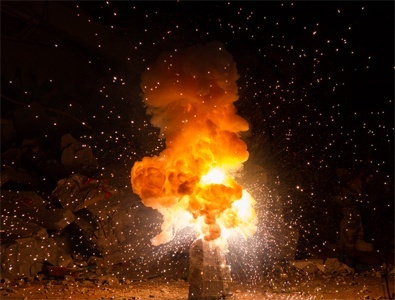Join ORR Protection experts Lee Kaiser and Aaron Wille as they discuss Lithium-Ion battery safety and fire suppression systems for battery energy storage systems, like those found in data centers.
In this part of the series, our experts will explore the topic of alarm systems and answer the following questions:- Does Li-on tamer utilize off-gas detection instead of the typical heat detection in battery management systems?
- Can battery management and UPS systems be integrated into the fire alarm system?
- What is the recommended best practice for a fire department first responder in a Lithium-Ion battery fire situation?
Transcript
I think you hit on something that's important there. Most systems that I'm aware of, have a battery management system that can be part of, or in addition to the UPS management system. Most battery management systems that Lee had referred earlier have some type of detection for thermal runaway. I think some customers sometimes think that because they have a heat detector that's built into the battery management system they're protected from thermal runaway. I think you covered that already, but it's important to state that Lyon Tamer is designed to detect, or the off-gassing, is detected earlier than thermal runaway. Correct?
Correct. The Li-on Tamer project is looking for that off-gas condition, which means that is heating up, turning those electrolytes to steam, and at that point, if we can detect that off-gas and take the power away to turn the battery management system off, we're going to have a better shot of controlling the thermal one runaway condition.
People ask how do we know that the battery management system isn't just going to catch this? There is third-party research out there that we've been reviewing that shows that there is an off-gas event usually before the battery management system can catch the incident. That’s an important point. There's a lot of confusion and questions about that. That's really the reason to have off-gas detection so that you get a jump on the situation so you can do something about it.
The batteries and UPS system have a battery management system. Have we been contacted by customers to interface the battery management system into the fire alarm system or integrate the battery management system and the fire alarm system?
I haven't been approached by it. In my opinion, it probably wouldn't be a bad idea. What have you heard?
You asked about the battery management system, but I think you also could be asking about the off-gas detectors so, is that appropriate to have an off-gas detector tied to the fire alarm system? It's definitely not there in the code. It’s not said to do that and fire marshals aren't used to seeing it yet. I think people in the industry are aware of off-gas detectors and what that means, what type of detection are we talking about. It’s definitely not there in the fire code. It's not there in 855 to do that. However, it always comes down to codes are minimum required standards and I personally think it makes a lot of sense to put our off-gas detection and have it come into the fire alarm panel system somehow.
But, I'm not sure the battery management system should come into the fire alarm system. Maybe, just as a supervisory or something like that. To me, with an off-gas detector, we can do some actionable things with that. The Lyon tamer detector goes off then we know that we've detected volatile organic compounds, which is the vaporous electrolyte for the batteries usually — can be other things. But then, we can do something about it. It may be locally alarming the responsible party. In a big data center, they're going to have an operation center, and building engineers that run that data center. We probably should set an alarm off there to let them know that the Lyon Tamer systems went off and their battery room A. They need to know that so they can start to investigate or look at the cameras that might be in that room to see what's going on. Then maybe if they have a readout of what's going on with the battery management system, is it doing anything and can they correlate that there's a problem between the two.
That's a good segue into the next question. We got a question from the fire service group, the fire departments and specifically how they should respond. I guess they're concerned about responding to a potentially explosive environment or how to respond to the fire. The question is what would be a recommended best practice for a first responder responding to a battery fire? What should they look for when they're entering the building?
Fire departments get into rhythms of how they respond to fires. If there are flames when they pull up in the big red trucks, people tend to start to get excited, right? Same thing if there's smoke. If they show up and there's nothing, then usually they take a slower approach. And I would think that this would be the same way. If there's an alarm come into the system and you pull up and you can't see anything from outside of the building, then you take a cautious approach. It’s going to depend on what they see and as they approached the room where the problem is. We would always say any recommendation, if it's a mission-critical building, it should be an addressable fire alarm system that has location information about where the problem is available at a display from the fire alarm system right as the fire department is entering the building so they can start to know that, in this case, battery room A has got a problem. There's detection going off in battery room A, so they need to figure out where battery room A is and then they need to approach that if as they walk up. If they see smoke coming out the door, then definitely they need to take a more cautious approach there. What I worry about, honestly the situation that I think fire departments are going to be up against is in the data center space. There are lots of data centers that have these batteries that have made no fire protection accommodations for them. I think that is a disservice to the fire service. It's putting people to have families at risk because when they see that smoke coming out of the door and there's no indication that smoke could be the white smoke, we know from the surprise Arizona event, the white smoke coming out of that battery container was explosive, right?
Or it was flammable gases, it was some combustion smoke, but it was mostly flammable gases. Well, that white smoke coming out of the door of the battery room could be flammable stuff, you open that door and we could wind up having that same situation. It's got to be a very cautious approach when you know that batteries are maybe part of the equation. If you're going to a high technology building or you're going to a building that has batteries in it as part of an energy storage scheme, whether for their own use or for resale to the outside market, they need to be labeled, you need to have the fire prevention people, the fire marshals in your towns, they need to be looking for this as a technology, they need to be requiring training for the fire department, and they need to be requiring labeling so when the responders do show up, they know that there's this extra hazard there and then they really need to slow the approach and take a more cautious approach. We're seeing the fire departments learn that. There was this big fire at an energy storage facility in Chandler, Arizona, on the other side of Phoenix from where the surprise event happened. It’s really an interesting case study because the fire department was aware, because of what happened in their backyard, and they took a slow approach. They allowed the fire sprinkler system to operate for 11 days. Have you ever been to a building that the sprinkler system was operated for more than an hour? 11 days and it's estimated 300,000 gallons of water was applied to that.
In fact, they were starting to recycle the water somehow through the fire sprinkler system. With data centers, there's no way. They don't like little leaks, let alone these big leaks. Fire departments are learning to take a cautious approach — the ones that are aware. There's lots of fire departments that aren't aware of the hazard that they're facing yet. Think of the big scale. There was a fire at a Google data center in Iowa just on the west side of Iowa, right on the Missouri River board of Nebraska, here recently. Those guys probably respond to that once every couple of years. They don't go there that frequently. Think about other rural data centers taking advantage of cheap power rates, and cheap real estate. Those fire departments aren't ready for this. There's a lot of education that the industry needs to be giving to fire departments so that people don't get hurt.







